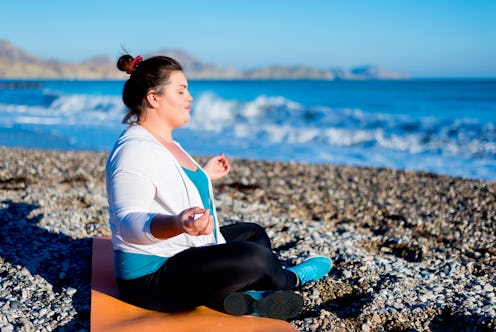Life
6 Things You Never Realized Can Cure Inflammation, According To Science

Skin issues, digestive troubles, joint pain — these are all symptoms of chronic inflammation. Everything from your genetics to your lifestyle habits can cause inflammation, so it should come as no surprise that engaging in some healthy habits can help reduce it. There are also a number of more surprising things that can cure inflammation, and adding these habits into your everyday life may be able to help your overall health. Understanding what causes inflammation — and what can help alleviate it — can be key to relieving some of your unpleasant symptoms caused by the issue.
"Since the word 'inflammation' is thrown around a lot, what chronic inflammation — and, in turn, anti-inflammatory — actually mean may be confusing," internist and gastroenterologist Dr. Niket Sonpal, tells Bustle. "To understand what chronic inflammation means, it's important to know how it compares to acute inflammation. Acute inflammation is your body's response to fight off infection or heal itself after trauma. Chronic inflammation, however, is much more nuanced. Chronic inflammation is a general term, and it can refer to a specific organ or system in the body."
Thankfully, there are various habits that can greatly reduce inflammation. Here are six things you didn't realize can help with inflammation, according to science.
1Getting Fresh Air
Most of us are exposed to air pollution in today’s modern world, and the smallest of particles, called small particulate matter, have been shown to activate receptors on white blood cells, which causes an increase in inflammatory activity. This pollution exposure can eventually lead to issues such as cardiovascular disease, according to research published in the Journal of the American College of Cardiology. "Although avoiding all pollution may be near impossible, certain steps such as avoiding living near major road ways or chemical facilities can be helpful," Ashira Blazer, rheumatologist at NYU Langone Health, tells Bustle. "Home air filters may also reduce pollutants."
2Eating Turmeric
There is growing evidence that curcumin, a compound found in turmeric, is an anti-inflammatory agent. "A meta-analysis in the Osteoarthritis and Cartilage Journal found that curcumin has the potential for relieving symptoms of osteoarthritis, although they recommend further scientific study," Dr. Sonpal says. "Although there aren't tons of studies on curcumin yet, there's enough to show it has potential." Add turmeric to your foods to help combat inflammation.
3Taking A Hot Bath
Hot water treatment, such as a hot bath, may help improve inflammation and blood sugar levels in people who are unable to exercise, according to a study published in the Journal of Applied Physiology. "Taking hot baths or getting a warm massage can help reduce chronic and lasting inflammation by increasing blood flow to an inflamed area, thereby increasing those healing benefits of increased circulation to an area involved," Dr. Mia Finkelston, a board-certified family physician who treats patients via telehealth app LiveHealth Online, tells Bustle.
However, in an acute injury, cold or cryotherapy is best to reduce inflammation. "This reduces blood flow to a particular area and can significantly reduce the swelling that causes pain, especially when it is around a joint or a tendon," she says.
4Eating A Mediterranean Diet
When it comes to reducing inflammation, lifestyle choices, like what you eat, matter. "If you're looking for an eating plan that closely follows the tenets of anti-inflammatory eating, consider the Mediterranean diet, which is high in fruits, vegetables, nuts, whole grains, fish, and healthy oils," Dr. Sonpal says. "The science behind these foods is inherent to their antioxidant properties. Stress and inflammation lead to oxidative stress in our body. These foods combat that."
5Working Out
When it comes to reducing inflammation, a little exercise can go a long way. As little as 20 minutes of exercise could have anti-inflammatory effects, according to a study published in the journal Brain, Behavior and Immunity. "Exercising regularly and avoiding a sedentary lifestyle may go a long way in regulating inflammation," Dr. Blazer says. "As an added benefit, exercise lowers blood sugar and LDL (bad) cholesterol, which relieves inflammation." Exercise also reduces the stress hormone cortisol, which is responsible for many of the symptoms of inflammation and the long-term negative consequences, according to Dr. Sonpal.
6Sleeping More
Sleep can not only leave you more well-rested, but it can help manage inflammation. "In one study published in JAMA Internal Medicine, white blood cells taken from otherwise healthy sleep deprived individuals produced significantly higher concentrations of inflammatory signals compared to those from rested individuals," Dr. Blazer says. Sleeping can also help manage stress, another cause of chronic inflammation. During sleep, your brain flushes out metabolic debris, and the body is put into a deep healing state, Dr. Sonpal says.
Adopting these habits can help reduce your inflammation and improve your overall health.